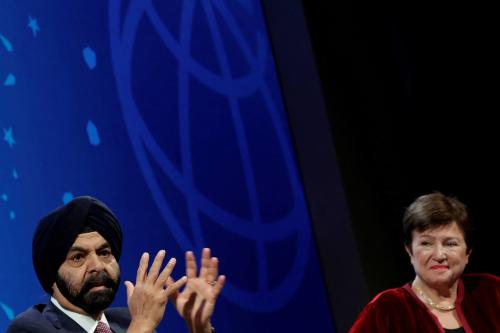What ever happened to all the grandiose plans for improving the global financial architecture? Up until a few years back, leading policy economists seemed to be tripping over themselves to come up with blueprints for radical change. Particularly popular were plans for new global institutions, including a financial regulator, a sovereign bankruptcy court, an international deposit insurance corporation, and even a global central bank. More modest plans (such as mine) merely called for a sweeping restructuring of the major existing multilateral financial institutions, the International Monetary Fund and the World Bank.
Over the past couple of years, however, all introspection appears to have vanished. Instead, the policy community has developed a smug belief that enhanced macroeconomic stability at the national level combined with continuing financial innovation at the international level have obviated any need to tinker with the system. Never mind that cross-border asset holdings have exploded to roughly $60,000bn (£30,500bn) (or about 120 per cent of global gross domestic product). There is no problem that markets cannot solve.
Really? How well would markets handle the fallout from a sharp slowdown in India or China? How would they react to a dirty nuclear bomb in a US city that triggered a retreat from US assets, and a sudden reluctance on the part of global investors to keep financing America’s 800-plus billion dollar current account deficit? Or a rapid escalation of conflict in the Middle East that encompassed Iran and Saudi Arabia? Or an avian flu pandemic? Global central bank co-operation has markedly improved in recent years, especially through the regular exchange of views that takes place every other month at the Bank for International Settlements. But contrary to market perceptions, global central banks have only very limited instruments for dealing with a genuinely sharp rise in global volatility, particularly one that is geo-politically induced.
True, it is not clear that any of the grand plans of the past couple of decades would better equip the world economy to deal with such catastrophic shifts. The typical grand plan was far too simplistic and heavy-handed to function effectively outside the confines of the comment pages. By and large, the world is far better off relying on more organic approaches that balance co-ordination and competition among national regulatory and legal institutions. If too much power is vested in a single global regulatory institution, there is a grave danger that innovation will be stifled. By the same token, a global central bank that faces no competition from other currency providers could easily prove an inflation-prone disaster.
But just because most grand plans were far too simplistic does not mean we should dismiss the deeper problems that they aimed to address. As global hedge funds proliferate and increasingly influence key markets, weaknesses in the co-ordination of national regulators of banks, which lend to hedge funds, have become even more glaring. Capital flows are once again rushing into emerging markets. Will the modest innovations in debt contracts adopted in the wake of Argentina’s default make much of a difference next time?
The real shame with the disappearance of grand plans is that theyhad provided a valuable reservoir of ideas to spur major improvements in the world’s existing multilateral financial institutions. The big problem today, of course, is that multilateral government lending has become increasingly irrelevant in a world where rapidly growing private debt and equity markets increasingly dwarf official financing.
The IMF is already engaged in a rethink of its role and function. Just last month, a group of eminent persons, chaired by former BIS head Sir Andrew Crockett, offered some constructive suggestions on how the IMF might finance its surveillance and technical assistance activities during a period when its revenues from crisis lending are rapidly dwindling. I would go further and simply eliminate most countries’ access to crisis lending altogether, on the grounds that, in practice, the availability of such resources often ends up just delaying adjustment (as in Argentina in 2001 or Russia in 1998), rather than cushioning it. My own grand plan, developed jointly with Stanford’s Professor Jeremy Bulow back in 1990, would also switch all World Bank lending to outright grants. A shift to grants would help shield some of the world’s poorest countries from excessive debt build-ups and, perhaps more importantly, make aid more transparent. But none of this seems likely right now, either.
We should bemoan the world’s lack of interest in grand plans to improve the financial architecture, but not because any of them was necessarily perfect. The problem, rather, is a lack of the purpose and energy needed to sustain even more modest, and unambiguously positive, reforms. Which means, of course, that after the next round of crises, we shall be deluged with even more and even grander plans.



Commentary
Op-edNo Grand Plans, but the Financial System Needs Fixing
February 8, 2007